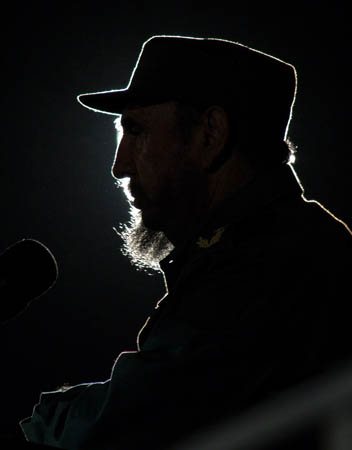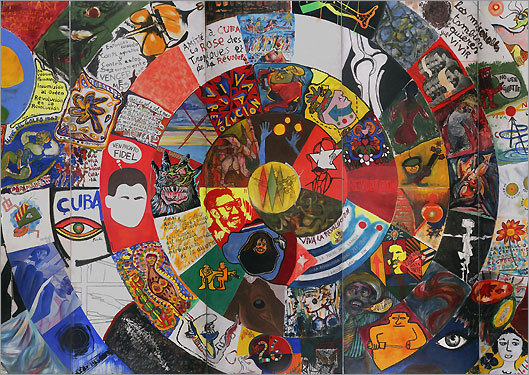 W
When then-Undersecretary John Bolton appeared before the Heritage Foundation
in 2002, he criticized the
1998 US threat assessment of Cuba as "unbalanced." The '98 assessment, which incorporated the findings of many US intelligence agencies, concluded: "
Cuba does not pose a significant military threat to the U.S. or to other countries in the region. Cuba has little motivation to engage in military activity beyond defense of its territory and political system." Nevertheless, Bolton still felt the assessment had "
underplay[ed]" the threat from Cuba, and he named the reason: Ana Belen Montes.
Just a couple of months before Bolton appeared at the Heritage Foundation, Ana Belen Montes, former leading Cuba analyst for the US Defense Intelligence Agency (DIA),
pleaded guilty to the charge of "conspiracy to commit espionage" for the Cuban government. Before she made
a plea deal, Montes faced the death penalty for this capital crime. She was eventually
sentenced to 25 years in prison after agreeing to cooperate with federal authorities.
But, despite the potential negative influence from Montes inside the DIA, current US threat assessments of Cuba have remained unchanged since 1998. Furthermore, any damage caused by Montes is unknown, and, unfortunately for the public, will most likely remain classified. Even a book released last year by the counter-intelligence officer who led an investigation against Montes provides
no verifiable proof of Montes' damage to US intelligence. But that didn't stop hard-liners from sowing distrust and paranoia.
Upon the release of Scott Carmichael's book
True Believer: Inside the Investigation and Capture of Ana Montes, Cuba's Master Spy, our favorite US Representatives Ileana Ros-Lehtinen, Lincoln and Mario Diaz-Balart set up a press conference to begin Carmichael's book tour and helped the author manipulate the threat of Cuban spies. The
Miami Herald quoted Rep. Lincoln Diaz-Balart saying: "
There are many Ana Belen Monteses, I believe, in other branches of the government of the United States, as well as in the private sector, in academia, in media, et cetera." The author, Scott Carmichael, shared a similar view. He
told El Nuevo Herald: "
Fidel Castro has been able to penetrate all of the US government with spies." And, on an
interview posted on the Babalu Blog Carmichael says: "
I believe Cuba has us thoroughly wired."
But, all of this is pure speculation, rather than assertion. Carmichael's grave concerns over Cuban espionage come from a lack of convincing evidence (and sometimes ignorance). According to
El Nuevo Herald, one of Carmichael's fears seem to stem from how it was "
very easy for the Cubans to recruit Ana Montes, and later situate her where they wanted, in the heart of US intelligence." But, in Carmichael's book, the events of Montes' recruitment is reduced to only ONE SENTENCE, which unfortunately omits how "very easy" it supposedly was to recruit Montes. Also, a
book review by Phil Peters points out how Carmichael's book relies more on belief, rather than fact: "
Carmichael lists cases where Montes, with her wide access to secrets, could have betrayed classified information of military value: the 1990 U.S. military action in Panama, the wars in El Salvador and Nicaragua, a 1987 guerrilla attack on a Salvadoran military base in which an American soldier was killed, the liberation of Kuwait. But Carmichael writes that he does not know if she did so."
Carmichael's views about Montes are also fueled by negative attributions which are very misinformed. Early in his book, Carmichael admits a strong bias towards those he investigates: "
Even after all these years as a mole hunter, that's my reaction to any spy we discover within the DIA staff. Their betrayal sickens me, angers me, and saddens my heart."[1] At a book presentation (available
on C-SPAN), Carmichael reveals this personal contempt by playing Montes' psychoanalyst. According to Carmichael, Montes had an "abusive father" (but Carmichael never mentions what kind of abuse) from which she, as the eldest child, had to protect her younger siblings from. This "trauma" of feeling insufficiently protective caused guilty feelings inside Montes, which later projected into her espionage activities for Cuba. It should be noted that this very elaborate explanation by Carmichael is based on his own admission that he "
didn't do additional library research or formal interviews"[1] in writing his book, and that he didn't even interview Montes' friends or co-workers. At his book presentation he admits: "
I could've interviewed a lot of her co-workers, I didn't do that either. I had enough of the story already to make the points I felt needed to be made, and I felt that I knew enough about her personally to cover that aspect of it as well." He admitted this to some of Montes' neighbors who attended the book presentation. They wondered why Carmichael didn't interview them.
As a student of psychology, I can say that the literature on how life traumas causes long-term negative effects is incredibly complex and requires a lot of detail and investigation, which Carmichael has conveniently manipulated or ignored. Thus, while Carmichael's psychoanalysis is based on ignorance better suited for Hollywood pictures, his logic is still seriously flawed. His initial premise that Montes was "morally outraged" at the US, which then (coupled with her feelings of guilt) drove her to become a spy, is false. In this case, it seems that Carmichael had failed to read Montes'
courtroom statement because she never said she was "morally outraged." Rather, Montes makes very clear in her statement what her personal motivations were in committing an act that she herself described as "morally wrong." But, she never mentions feelings of rage or anger. Furthermore, one doesn't have to be a psychoanalyst to understand the facts that surround why Montes might have felt "
morally obligated" in her actions to "
counter a grave injustice."
One year before Carmichael,
Bill Gertz wrote about the Montes case in his book titled
Enemies: How America's Foes Steal Our Vital Secrets and How We Let It Happen. Unlike Carmichael, Gertz strives to provide more details into Montes' espionage recruitment, and quotes a counter-intelligence officer saying "
Montes established a relationship with the Cubans as a way to aid the Sandinistas. Following the electoral defeat of the Sandinistas in 1990, helping Cuba became her priority." Back in the eighties, the US was supporting rebel groups (Contras) to overthrow the Sandinista government in Nicaragua. The
background of this conflict is also complicated, but during the armed conflict Nicaragua made formal complaints at the International Court of Justice (ICJ). The
final decision (
Summary of the Judgment) by the ICJ in 1986 charged the US with committing clear violations of international law against the Sandinista government:
"
The Court finds it clearly established that the United States intended, by its support of the Contras, to coerce Nicaragua in respect of matters in which each State is permitted to decide freely, and that the intention of the Contras themselves was to overthrow the present Government of Nicaragua... It therefore finds that the support given by the United States to the military and paramilitary activities of the Contras in Nicaragua, by financial support, training, supply of weapons, intelligence and logistic support, constitutes a clear breach of the principle of non-intervention."
The ICJ also rejected US claims of self-defense: "
Since the plea of collective self-defense advanced by the United States cannot be upheld, it follows that the United States has violated the principle prohibiting recourse to the threat or use of force." In other words, the US committed an act of aggression against the Sandinista government, which is an act considered under international law as the "
supreme international crime."
Benjamin B. Ferencz, former prosecutor at the Nuremberg Trials, explains why.
Could an act like this by the United States against another nation make someone (especially someone inside its elite institutions) feel "morally obligated" to do something? Of course. Examining the threats of US policy towards Cuba also raises the same question. But, the actions that follow require another standard of moral justification. According to her courtroom statement, Montes' engaged in espionage: "
because I obeyed my conscience rather than the law."
Past examples like US policy towards Nicaragua and Cuba should serve as relevant background when considering why the US would be a potential target for international espionage. According to a
recent global survey, the US is considered the "
greatest threat" to many nations around the world.
But these facts are easily ignored by hard-liners, which then results in imaginative explanations (like Carmichael's psychoanalysis) about the actions of those who "betray" their country. When crimes that the US commits against other nations are ignored or minimized, hard-liners are left bewildered. By the end of his book, Scott Carmichael is still left asking:
"
But what caused such rage within this young woman that she felt compelled to act in a manner that most of us consider to be irrational, irresponsible, and unlawful?... Why was Ana Montes so angered by the effect that U.S. government policies had, or were perceived to have, upon the Nicaraguan and Cuban people that she felt compelled to insert herself as their savior?"[2]
Unwilling to consider the relevant facts, Carmichael settles with an explanation that reveals his contempt and ignorance for Montes (and others who would share her beliefs): "
She was a true believer, out to slay the dragon." And there are, unfortunately, many like Carmichael who see the world the same way. They see Cuban intelligence as a great threat to the US, involved in
a sinister global conspiracy. But, hardly ever consider looking at the actions of their own country.
Source: Carmichael, Scott W. (2007).
True believer: Inside the investigation and capture of Ana Montes, Cuba's master spy. Annapolis, MD: Naval Institute Press.
[1]Page
ix[2] Page 149.
[
Part 3]
 "Here is the true meaning and value of compassion and nonviolence, when it helps us to see the enemy's point of view, to hear his questions, to know his assessment of ourselves. For from his view we may indeed see the basic weaknesses of our own condition, and if we are mature, we may learn and grow and profit from the wisdom of the brothers who are called the opposition."
"Here is the true meaning and value of compassion and nonviolence, when it helps us to see the enemy's point of view, to hear his questions, to know his assessment of ourselves. For from his view we may indeed see the basic weaknesses of our own condition, and if we are mature, we may learn and grow and profit from the wisdom of the brothers who are called the opposition."











